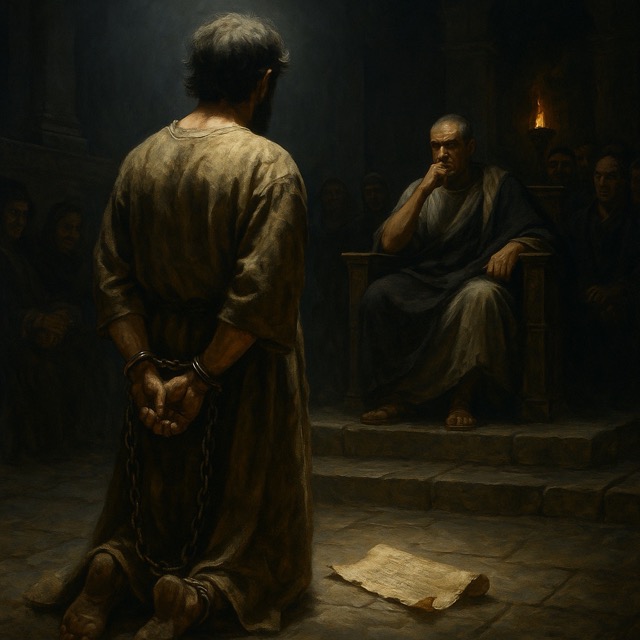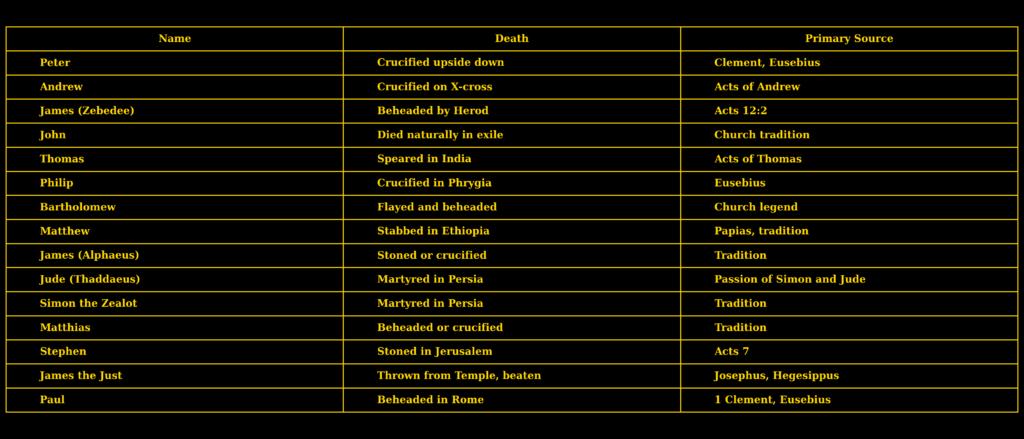The martyrdom of Jesus’s disciples stands as one of the strongest historical cases for the truth of Christianity. These men walked with Jesus — and died to prove it.
The martyrdom of Jesus’s disciples stands as one of the most compelling arguments for the truth of Christianity. These men didn’t die for secondhand legends — they died for what they claimed to witness firsthand: the resurrected Christ.
From the Roman Empire to distant lands like India and Armenia, the early followers of Jesus endured brutal deaths. And nearly every one of them had walked, talked, and ministered with Jesus Himself. Their testimonies weren’t recanted, even under torture. That kind of devotion demands investigation.
This article explores what history and tradition tell us about the deaths of Jesus’s closest followers — and what those deaths reveal about the sincerity and truth of their message.
Want the full breakdown of fulfilled messianic prophecy?
View our master guide: 351 Prophecies Jesus Fulfilled in Scripture →
✝️ Want to go EVEN deeper?
Explore the historical evidence of Jesus through ancient writings, Roman records, and archaeological discoveries that confirm His life and crucifixion. 🔍 Read the full article →

🩸 Why Were the Disciples Killed?
The message the disciples preached was disruptive:
- Jesus is the risen Son of God
- Caesar is not lord — Jesus is
- Idols are false — the God of Israel alone saves
These claims shook the religious foundations of Judaism and the political order of Rome. Proclaiming Jesus as Lord wasn’t just controversial — it was treason.
“We must obey God rather than men.” — Acts 5:29
The disciples weren’t killed for being kind. They were killed because their bold claims undermined earthly power.

📜 Martyrdom Accounts of the Twelve Apostles
Each apostle met a unique end, but most shared one thing: they died proclaiming Jesus was alive.
Peter
- How he knew Jesus: Inner circle (with James and John); leader of the Twelve
- Death: Crucified upside down in Rome under Nero
- Sources: Clement of Rome, Eusebius, Tertullian
🔗 Want to go deeper?
Explore the full story of Peter’s life, faith, and upside-down crucifixion in our in-depth feature:
👉 Peter’s Martyrdom: From Denial to Glory
Andrew
- How he knew Jesus: First disciple (John 1:40); brother of Peter
- Death: Crucified on an X-shaped cross in Patras, Greece
- Sources: Acts of Andrew (tradition), Eusebius
🔗 Want to go deeper?
Discover how the first disciple became the first evangelist — and why he chose the cross over comfort.
👉 The Martyrdom of Saint Andrew: Quiet Faith, Bold Endurance
James (son of Zebedee)
- How he knew Jesus: One of the first disciples; part of inner circle
- Death: Beheaded by King Herod Agrippa I in Jerusalem (~44 AD)
- Sources: Acts 12:2
John
- How he knew Jesus: The beloved disciple; part of the inner circle
- Death: Exiled to Patmos; died of old age in Ephesus
- Sources: Early church tradition, Eusebius
Thomas
- How he knew Jesus: One of the Twelve; doubted and believed
- Death: Speared to death in India
- Sources: Acts of Thomas (tradition), Eusebius
Philip
- How he knew Jesus: One of the original Twelve
- Death: Crucified in Hierapolis (Asia Minor)
- Sources: Eusebius, church tradition
Bartholomew
- How he knew Jesus: Possibly Nathanael (John 1); one of the Twelve
- Death: Flayed alive and beheaded in Armenia
- Sources: Church legend, Catholic Encyclopedia
Matthew
- How he knew Jesus: Tax collector called by Jesus; Gospel author
- Death: Possibly stabbed to death in Ethiopia
- Sources: Papias, church tradition
James (son of Alphaeus)
- How he knew Jesus: One of the lesser-known Twelve
- Death: Possibly stoned or crucified in Egypt or Jerusalem
- Sources: Church tradition, pseudo-Hippolytus
Jude (Thaddaeus)
- How he knew Jesus: One of the Twelve; possibly Jesus’s relative
- Death: Martyred in Persia
- Sources: Passion of Simon and Jude (tradition)
Simon the Zealot
- How he knew Jesus: One of the Twelve; possible revolutionary background
- Death: Martyred in Persia with Jude
- Sources: Church legend, Catholic tradition
Matthias
- How he knew Jesus: Witness to Jesus’s ministry (Acts 1); replacement for Judas
- Death: Possibly crucified or beheaded in Colchis or Jerusalem
- Sources: Church tradition

📖 Early Martyrs Beyond the Twelve: Disciples Who Died for Christ
Not all key martyrs were part of the original Twelve. Some, like Stephen and James the Just, were leaders of the early church who knew Jesus or saw Him resurrected. Others, like Paul, encountered Christ post-resurrection and became pillars of the faith.
🪨 Stephen — The First Christian Martyr
- How he knew Jesus: Likely a believer shortly after Pentecost; spirit-filled leader and evangelist.
- Death: Stoned to death in Jerusalem (~AD 34).
- Why: Preached that Jesus was the Righteous One foretold by the prophets.
- Source: Acts 6–7
Stephen boldly confronted the Sanhedrin, calling them betrayers and murderers of the Messiah. As he was stoned, he prayed for his attackers and cried out, “Lord Jesus, receive my spirit” — echoing Jesus’s own words (Acts 7:59–60).
🧱 James the Just — The Brother of Jesus
- How he knew Jesus: Physical half-brother of Jesus (Galatians 1:19); became a believer after the resurrection.
- Death: Thrown from the Temple, then beaten to death with a club (~AD 62).
- Why: His leadership in the Jerusalem church and unwavering belief in the risen Christ.
- Sources: Josephus (Antiquities 20.9.1), Hegesippus (via Eusebius)
James was known for his righteousness even among non-Christians. According to Josephus, his death caused public outrage in Jerusalem. His martyrdom shows how even Jesus’s own family came to believe He was the risen Lord.
🗡️ Paul (Saul of Tarsus)
- How he knew Jesus: Saw the risen Christ in a post-resurrection appearance (Acts 9); considered himself the least of the apostles.
- Death: Beheaded in Rome (~AD 64–67) under Emperor Nero.
- Why: His evangelism across the Roman Empire and proclamation of Jesus as the Messiah.
- Sources: 1 Clement, Eusebius, church tradition
Paul’s transformation from church persecutor to Gospel preacher is one of the most dramatic in history. His willingness to suffer flogging, imprisonment, shipwreck, and execution reflects sincere belief in the risen Jesus (2 Corinthians 11:23–28).

🔍 Why the Martyrdom of Jesus’s Disciples Matters
Skeptics often ask, “How do we know the disciples didn’t just make it all up?”
The answer? They died refusing to deny it.
These weren’t cult leaders gaining wealth or power. They were hunted, hated, beaten, and executed — not for a vague spiritual idea, but for proclaiming that Jesus rose from the dead. And most importantly: they claimed to have seen Him alive.
🛡️ Dying for a Lie?
Yes — people throughout history have died for lies they believed were true. But the disciples were in a unique position to know if the resurrection was a lie. They weren’t secondhand believers — they were firsthand witnesses.
- If the body was stolen, they would have known.
- If Jesus stayed dead, they would have known.
- And yet, they were willing to die rather than deny it.
💡 What Martyrdom Proves
Martyrdom doesn’t prove the resurrection happened. But it proves this:
They sincerely believed it did.
They didn’t die for a metaphor. They died proclaiming a physical, risen Jesus — the same one who had walked, eaten, and spoken with them after the cross.
🧠 Even Secular Scholars Acknowledge…
Historians who reject Christianity still admit the disciples believed they saw Jesus after His death:
- Bart Ehrman (agnostic NT scholar): “We can say with complete certainty that some of His followers came to believe that He had been raised from the dead.”
- Gerd Lüdemann (atheist NT historian): “It may be taken as historically certain that Peter and the disciples had experiences… of the risen Jesus.”
🔒 In Short…
The apostles weren’t executed for something they hoped was true…
They died because they knew it was.
And they would rather lose their lives… than lose the truth.
Apostolic Martyrdom Summary


🏁 Conclusion: They Didn’t Die for a Lie
These weren’t men chasing myths.
They were fishermen, tax collectors, skeptics, and sinners — transformed by something they saw with their own eyes: a man who walked out of the grave.
And they didn’t just preach it…
They bled for it.
Peter didn’t cling to influence.
He clung to a cross — upside down.
James didn’t run.
He faced the sword.
Thomas, once the doubter, died pierced for his unwavering belief.
And Paul — once the Church’s fiercest enemy — became its greatest voice, beheaded for a Savior he once hated.
No one willingly dies for what they know is a lie.
But nearly every one of these men did — and none recanted.
Their martyrdom isn’t proof of a legend.
It’s evidence of truth believed so deeply… it cost them everything.
So what about us?
We may not face crosses or prisons.
But we face comfort, compromise, and the slow drift of apathy.
And the question comes:
🕊️ What are you willing to live for?
🔥 What would you die for?
The disciples didn’t die to start a religion.
They died because they saw Jesus alive… and could never be the same.
🔗 Related Bible Studies & Deep Dives
Looking to understand more about the reality of Jesus and why the disciples died proclaiming Him?
Here are powerful studies that build on this article:
- 👉 Historical Evidence of Jesus: Proof from the Ancient World
Explore archaeological finds and ancient sources confirming Jesus’s life and crucifixion. - 👉 Was Jesus a Liar? Examining the Evidence Against Deception
If Jesus wasn’t telling the truth, why did people die believing Him? - 👉 Prophecies of Jesus Fulfilled in Scripture
See how over 300 Old Testament prophecies were fulfilled in Jesus’s life, death, and resurrection. - 👉 Messianic Prophecies of Jesus’s Suffering and Crucifixion
Go deeper into Isaiah 53, Psalm 22, and more — prophecies the disciples saw fulfilled. - 👉 Eschatological Prophecies of Jesus: His Return, Reign, and the New Creation
The same Jesus they died for… is coming again.
🌐 Trusted External Sources
For further exploration into the historical and contemporary aspects of Christian martyrdom and discipleship, consider these reputable resources:
- Christian History Institute – How the Early Church Viewed Martyrs
Delve into the early church’s theology of martyrdom, shaped amidst persecution and trials. Christian History Institute+2Christian History Institute+2Christian History Institute+2 - Christian History Institute – Polycarp’s Martyrdom
Read the earliest recorded account of a Christian martyrdom outside the New Testament, offering a vivid portrayal of steadfast faith. Christian History Institute - Open Doors – World Watch List 2025
Stay informed about the top 50 countries where Christians face extreme persecution, and learn how to support them. Christianity Today+6Open Doors UK & Ireland+6

❓ Frequently Asked Questions About the Disciples’ Martyrdom
🙋♂️ Why were the disciples willing to die?
Because they believed they had seen Jesus alive after His crucifixion. They didn’t die for a philosophy — they died for a resurrected person they had touched, spoken to, and followed.
⚔️ Did all the apostles die as martyrs?
All but one. According to tradition, John died of old age in exile. The rest — including Peter, James, Andrew, and Paul — were executed in brutal ways for proclaiming Christ.
🧠 Isn’t it possible they were just sincerely wrong?
People can die for lies they believe. But the disciples were in a position to know if it was a lie. They claimed to see and touch the risen Jesus. If it wasn’t true — they would have known.
📚 What sources support the apostles’ martyrdoms?
Historical sources include Acts of the Apostles, Clement of Rome, Eusebius, and early church writings like the Acts of Andrew and Polycarp’s Martyrdom. While not all are equally verified, the core pattern is consistent.
🌍 Why does this matter today?
Because it shows that Christianity wasn’t invented centuries later. It began with eyewitnesses who died rather than deny what they saw — giving credibility to the resurrection at the heart of the faith.
💥 What can I take away from their example?
Their courage challenges us to live bold, uncompromising lives of faith. While most of us won’t face martyrdom, we’re called to live as if Jesus really is King — because He is.




